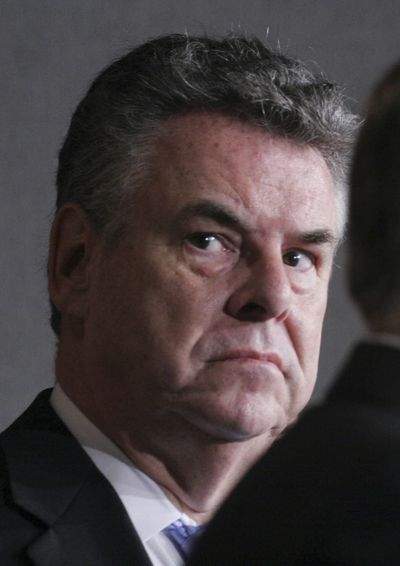Muslim hearings’ organizer sure of support despite outcry

WASHINGTON – For Rep. Peter King, 9/11 was personal. It was personal, the Republican chairman of the House Committee on Homeland Security says, for everyone in his Long Island district, which was home to dozens of the cops, firefighters and financial workers who died at the World Trade Center that day.
And despite concerted nationwide criticism of his plan to hold a hearing today on radicalization in the U.S. Muslim community, King says in his district he has nearly universal support.
“Everyone is telling me to go ahead with it,” King said in an interview, adding that he thinks his district is a good place to measure public opinion in the U.S. on such issues. “My district, I think it is a good barometer. Nobody in my district didn’t know somebody who was killed on Sept. 11. It is still very personal.”
King has been questioned by critics for his approach to hearings that some argue go too far in lumping all Muslim Americans in with the radicals and Islamic extremists who would do harm to America. The hearings, critics argue, will do nothing to stem domestic terrorism and may in fact hurt King’s cause by further alienating the very community law enforcement agencies rely on to prevent attacks.
“To the extent that these hearings make American Muslims feel that they are the object of fear mongering, it will only serve al-Qaida’s ends,” said Richard Clarke, former counterterrorism adviser to Bill Clinton and George W. Bush.
In holding the hearings, King wants to highlight what he sees as an unwillingness by the leaders in the Muslim community to aggressively prevent radicalization of young men and engage in robust cooperation with law enforcement to prevent attacks. Two family members of American young men seduced by Islamic extremism are expected to testify to their frustrations at the lack of assistance they received from local religious leaders to counteract their loved ones’ radicalization.
But research by two North Carolina universities shows that Muslims have been the top source of tips that have thwarted homeland terror plots. King’s critics say the hearings are unlikely to yield revelations or investigative breakthroughs and will only serve to promote anti-Islamic sentiment in the United States.
King points out that Obama administration officials have made the same observations he has about the rise in homeland plots attempted in the name of Islam, even if he has been less careful in his choice of words.
Deputy national security adviser Denis McDonough, for example, told a Virginia-based Muslim community group this week that the old assumptions that the unique melting pot made the U.S. immune to al-Qaida’s attempts to radicalize people in the U.S. “was false hope and false comfort.”
But Obama administration officials have gone out of their way to paint the American Muslim community as part of the solution, not the problem.
“The most effective voices against al-Qaida’s warped worldview and interpretation of Islam are other Muslims,” McDonough said on Sunday. McDonough also met with Muslim activists and community leaders in the White House on Wednesday in advance of King’s hearing to assure them that the Obama administration doesn’t endorse efforts to alienate the Muslim community.
A research report from Duke University and the University of North Carolina released last month examined terror investigations since Sept. 11, 2001, and found that fellow Muslims provided useful tips that helped arrest 48 of 120 Muslims suspected of plotting attacks in the U.S.
Singling out one religious community for scrutiny “is the heart of scapegoating,” said Rep. Keith Ellison, D-Minn., who is Muslim and felt it was important that he agree to testify in today’s hearing, even though he disagrees with King’s approach.
“This hearing is not going to help. Will it hurt? I hope not. Will it help? Definitely not. … We need a greater level of engagement and more trust, and these hearings do the opposite,” Ellison said.
King has never been one to shy away from controversy, and that has boosted his popularity in his blue-collar district. He hasn’t had a close race since he was first elected in 1992. In November, King won his 10th term in Congress with 72 percent of the vote, his highest margin.
He was a visible supporter of the Irish Republican Army, which his critics have pointed out was engaged in terrorist activity in the 1980s. He spoke in favor of the struggle against “British imperialism” at a pro-IRA rally on Long Island in 1982. King has said that the IRA never targeted Americans and his loyalty is with the U.S.
Some who have followed him for a long time saw a shift in King’s attitude after Sept. 11, when he took a hard line on illegal immigration and Islamic terrorism. “I’ve detected a change,” said Niall O’Dowd, founder of the Irish Central, the largest Irish-American news website, who has known King for more than 25 years. “I think he’s gone off the rails.”